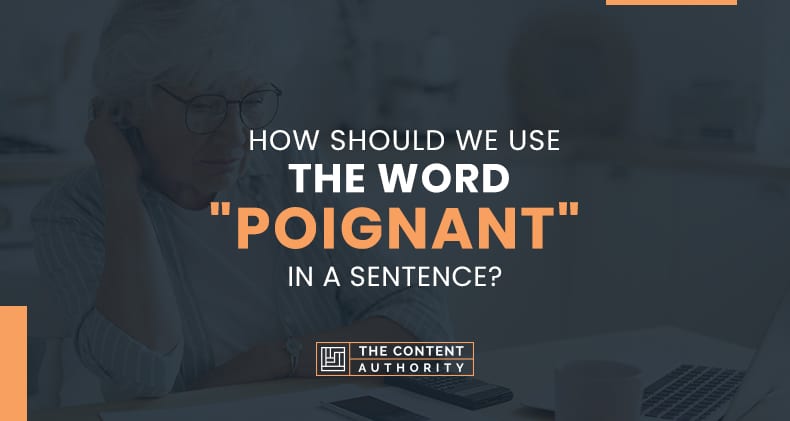An interesting fact is that English is the third most spoken language globally and happens to be one of the most studied languages. It is also made up of rarely used words such as “poignant.” Let’s take a closer look at this word and what it means.
The word “poignant” means that something strongly affects senses or emotions, particularly smell. It may also be used to imply whether something is piercing, penetrating, incisive, intense, or stimulating. In some cases, it means causing or having a sharp feeling, usually of sadness.
“Poignant” – Definition
As we mentioned earlier, the word “poignant” means biting, sharp to the taste, pointed, keen, piercing, acute or very painful, intense, acrid, or caustic. It may also mean stinging, pricking, satirical, and pungent, among other words.
“Poignant” Vs “Pungent”
Many words in the English language are often confused with other words either spelled similarly or sounding the same when pronounced. The word “pungent” is believed by many to have the same meaning as the word “poignant,” however, they have their differences. So let’s take a deeper look at the word “pungent.”
The definition of the word “pungent” is “having a sharp, strong smell or taste,” while the word “poignant” means “a strong feeling of sadness.” Both these words have their roots in the Latin word, “pungere,” and have a shared history, meaning “to sting or to prick.”
These two words have changed since then and while “poignant” initially meant “piquant and sharp to the taste,” “pungent” meant “painful.” So as you can see, they have had their meanings swapped, and the “pain” in “poignant” now is emotional instead of physical. It’s almost as if the meanings have swapped over since piquant or sharp is an ideal synonym for the word “pungent” as we know it today.
Some other interesting facts about these words are that they are related if you go back in time. For instance, “pungere” is derived from “pugnus,” which is Latin for “fist.” This word is also the origin of “pugnacious,” meaning “aggressive,” and “pugilist,” meaning “boxer,” and both of these words have a coherent association to fists. Another point to note is that “poing” is the French word for “fist” and explains why “poignant” is spelled the way it is. However, “poignant” hails from French and “pungent” hails from Latin.
The connection or confusion between the words “poignant” and “pungent” only gets better since, in Merriam Webster’s Dictionary, “pungent” is sharply painful, and “poignant” is painfully sharp.
Can “Poignant” be Used in Both Positive and Negative Contexts?
The word “poignant” implies that something is stimulating or pleasantly touching. It also means “to the point” and can be used in positive ways.
Example: I found Tom Cruise’s performance in Mission Impossible incredibly poignant.
However, the word “poignant” can be used to imply a negative connotation when it refers to a reaction that invokes deep sadness and tears or is utterly painful.
Example: It was a poignant plummet from his esteemed position.
Example: She experienced a poignant loss of sense because of the tragedy.
Example: Visiting her old school aroused poignant memories of the bullying she had faced due to her stutter.
“Poignant” is also an adjective and may be used to describe or explain a situation that can sharply or strongly affect your emotions.
Example: He made a poignant video of life in an orphanage. The writer continues to value the effectiveness of the documentary, though the life is full of pathos.
Example: The community paid a poignant tribute to the martyr.
“Poignant” may be used to convey different variations of meaning as per the context; however, it usually describes something that is moving or deeply touching.
“Poignant” – Synonyms and Meanings
- Incisive: Possessing the character of cutting, incising, or penetrating, as with a sharp or acute instrument; biting.
- Painful: Needing much care and diligence:
- Pungent: Piercing and sharp to the mind; painful; poignant;
- Stinging: Possessing the magnitude to sting.
- Sharp: Impetuous or fierce; violent
- Pricking: Sharp
- Keen: Heated; fierce; as, a yearning appetite.
- Touching: Arousing sadness and sympathy.
- Emotional: Readily affected with or stirred by emotion
- Moving (related): (no comparative or superlative) That moves or move.
- Affecting: Emotionally heart-breaking, summoning compassion, sympathy, etc.
- Piquant: Pleasantly pungent or refreshing to the taste; pleasingly biting or sharp
- Stirring: Energizing and encouraging
- Piercing: Anything or anyone that punctures, penetrates or makes a hole in
- Smells (related): Influencing the organs of smell or taste with a powerful and often raspy sensation
- Pitiful (related): Arousing disrespectful pity, as through incompetent or insufficient.
- Sad (related): Indicating, demonstrating, expressing, or feeling unhappiness, sadness or sorrow.
- Acute: Having a critical inclination.
- Bitter: Being or possessing a taste that is acrid, sharp, and unpleasant.
- Distressing: Causing anguish; perturbing, unsettling, upsetting
- Touching: Inspiring unhappiness and sorrow.
- Emotional: Willingly affected with or mixed by sentiment
- Moving: (related)(no comparative or superlative) That moves or move.
- Affecting: Sentimentally or emotionally touching; inspiring concern, pity, compassion, sympathy, etc.
- Piquant: Agreeably pungent or stimulating to the taste; pleasantly sharp or biting
- Stirring: Invigorating or inspiring
- Heartrending (related)
- Touchingly (related): heart-breaking (related)
- Sarcastic: (related)(Of a person) Having the personality trait of expressing sarcasm.
- Astute: Swift and hypercritical, discerning
- Biting: Of or relating to bugs or insects and certain other animals that injure the skin with a prick, nip sting, mouthparts, or fangs.
- Cutting: Sharply dividing, carving, penetrating; dicing, incising, piercing
- Sour: Unsavory or irksome.
“Poignant” – Antonyms and Meanings
- Pleasant: The definition of pleasant is something or someone that is likable, charming, or pleasing.
- Numb: The definition of numb is something or someone who is desensitized, unfeeling, or powerless to move.
- Dull: Cloudy, uninteresting, boring, tedious, or overcast:
- Blah: Uninspiring, low in spirit or health; lifeless, down
“Poignant” Used in Quotes Said by Famous People
- “I’m tremendously grateful that we invited Muslims. It seems we share the pain of all who suffer, and in many ways, the opinions voiced were utterly strong. Lots of those comments were very poignant.”-Danielle Ludon
- “After witnessing the feeble manner James Foley was murdered, It became evident that I had to do something and something that was most poignant for me.”-Michael Enright
- “It has consistently been such a distinctive song and a very poignant song, and each time I play the song, I am moved to tears because I’m thinking of my mum, my grandmother, and my friends who are struggling to make ends meet.”-Alicia Keys
- “The most phenomenal thing about young men is their inconspicuousness at that young age. It is certainly the most poignant.”-Perry Brass
- “Success is temporary and short-lived. The actual enthusiasm rests on the poignant procurement of knowledge pertaining to the subtleties and shading of the creative mysteries.”-Constantin Stanislavski
Example Sentences Using the Word “Poignant”
- It was one of the numerous poignant moments I experienced on holiday.
- The situation was too poignant to be funny.
- It was a poignant representation of the war’s influences that moved each and every facet of society.
- Old lady Janet’s words of wisdom have indeed become poignant.
- Although it is not emotionally or spiritually unproductive, as this may advocate, but it is surprisingly poignant.
- Visit this page to view some very poignant images of the remains surrounding the scene.
- The recollection was poignant, cloaked by affairs that took place once she mentioned that she was expecting.
- It was nothing short of a poignant memoir signifying their lost life together.
- Passionately sung by Chris, the lyrics were poignant.
- Despite the calamity, the plane was ravaged for souvenirs, which made the story poignant.
- There is a specifically poignant moment in the movie.
- Working together with him on the documentary has made the entire process seem more poignant.
- She visited his grave after 50 years and was inspired to write a memoir of their struggles in love, life, and marriage.
- The conviction in their tone was poignant.
- Different men will have different stories, irrespective of whether they are hilarious, poignant, or a mixture of both.
- Some stories of how couples met range from moving and poignant to downright disastrous and amusing.
- You are able to affect change in someone’s life by bringing about a smile or poignant thought using words of wisdom, your own experiences, or simply lending a genuine and concerned ear.
Conclusion
The word “poignant” is one of the lesser or rarely used words in the English dictionary. However, as you’ve seen, it may be used to imply profound or moving thoughts, feelings, opinions, and emotions.
So ultimately, “poignant” may be used to describe a person, moment, memory, or situation that has a strong or intense effect on your senses and emotions. Many people are not even aware of what the word “poignant” actually means, but with a little due diligence, you can learn to use this word effortlessly in your writing and other communications as well.
Although there are frequently used synonyms for the word “poignant,” why not wow your friends the next time you meet by displaying your “poignancy.”
Shawn Manaher is the founder and CEO of The Content Authority. He’s one part content manager, one part writing ninja organizer, and two parts leader of top content creators. You don’t even want to know what he calls pancakes.




